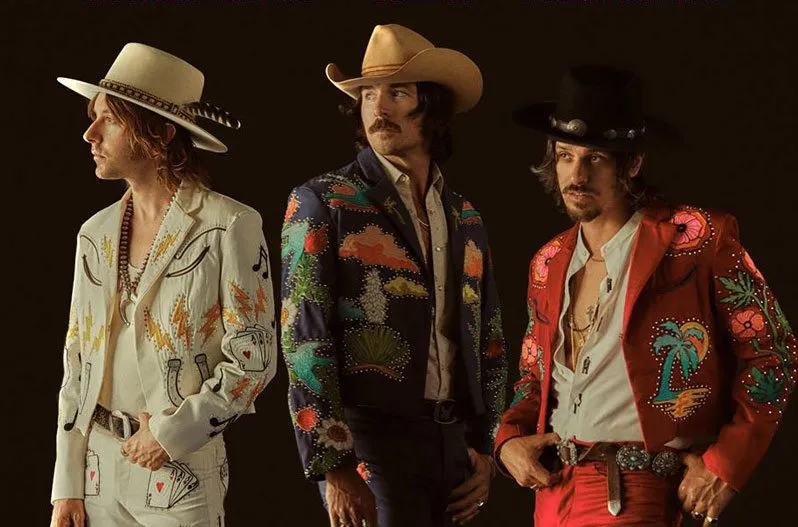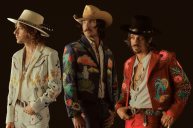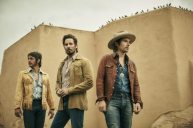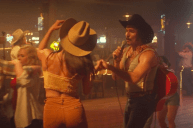Editor's note: Jeremy Burchard is a Senior Music Writer for Wide Open Country and Associate Editor of Texas Music. The following op-ed is a response to articles by the blog Saving Country Music that question the legitimacy and authenticity of rising country trio Midland.
Kyle Coroneos, the author and founder of Saving Country Music, is wrong about Midland. Also known as "Trigger," he is a talented writer with strong convictions and a passionate readership.
But he's wrong about that band. He's wrong when he calls them "bullshitters." He's wrong when he calls two-thirds of them "Hollywood elite," and he's very wrong when he claims they didn't write their music, but are instead the product of Shane McAnally and Music Row machinations.
And it matters that he's wrong. Because over the past week, Coroneos' articles have been making their way across important spheres of influence. People within the music industry, whom I know and respect, are reading these articles and sharing them, taking them at face value. People who work in radio, other artists, venue owners, publicists and writers see this narrative. And because those articles seem compelling (if not dramatic), a lot of them believe it, which is both unfair and potentially damaging to a band that, despite their recent success, is still new to a lot of people.
The "Authenticity" Argument
I authored a spotlight article on Midland for the new issue of Texas Music magazine, spending hours researching the band and listening to both their new and old music. I interviewed them, songwriter/producer Shane McAnally and producer Dan Huff. And I watched them perform at the Springwater Supper Club & Lounge in Nashville. They served mini hamburgers and mini hot dogs. I was tempted, but refrained.
"Authenticity" is a slippery slope and a pointless argument. About 95% of George Strait's music came from other writers. Brad Paisley doesn't drink alcohol but one of his most popular songs ever is called "Alcohol." Robert Johnson never sold his soul to the devil, and the Beatles intentionally fed false stories to New Musical Express. It goes on and on.
But Coroneos seems to create his own benchmarks of authenticity and then peddles accusations to meet them. He never spoke to the band or anybody associated with them. He intentionally does this, he tells me, because he believes interviews can "erode objectivity."
"I'm not against others interviewing artists," Coroneos explained to me over email. "But since I specialize in criticism and commentary, it generally behooves me to stay once removed from interacting with artists beyond cordial, brief exchanges that may happen in the course of business." I get the sentiment there.
But interviews are the cornerstone of journalism. Combined with independent fact-checking and cross-referencing, they form the very basis of what we do. As uncomfortable as it may be, our job is to do what we can to get facts first-hand, even if they point towards a warranted lambasting of people we know personally.
As a writer who specializes in criticism — and Coroneos is a very gifted writer — he relies heavily on other journalists to lay the groundwork for him. In his case, he hasn't seen Midland perform live (though he wants to when the opportunity presents itself). Which, to his point, he doesn't need to see them live to critique their record. But it's the least you could do if you're going to call a band bullshitting elitists who don't even write their own music.
"Hollywood Elite"
So let's correct a few talking points used to de-legitimize the band. Like Mark Wystrach's modeling and acting roles and Cameron Duddy directing music videos. Coroneos says this makes the pair "part of the power elite of the entertainment world." Who knew underwear models held so much power?
In reality, Wystrach lived in a trailer by the beach. He tended bar way more than he modeled or acted. Those gigs are low paying, hard to come by and hardly "elite." Directing music videos is just as volatile. And a great way to go gray in the hair before you're thirty.
All of Duddy's videography gigs supported his music habit, including his early band with Jess Carson Major Gray. Anybody who really believes that being the son of the second camera operator on 1999's Mystery Men lands you a job with Bruno Mars is either a great comedian or woefully uninformed.
Duddy explained in an earlier interview, "I couldn't get any job through my parents. I had rock, folk, Americana bands. I just started doing videos for my friends." And eventually it grew, Duddy made friends, one gig led to another. Just like every person hustling.
Coroneos' "Hollywood elite" jab backs artists into a corner and makes them defensive, so they talk about living hand to mouth and borrowing money from their manager to stay afloat. Both of those applied to Duddy, and it's *embarrassing* the band feels they have to defend themselves so much that they're revealing personal financial details instead of talking about music. Because it shouldn't matter.
Yes, Duddy used connections to get a foot in the door. His friend, who manages pop acts and has no experience in country, liked their 2014 Sonic Ranch demos (helmed by Austin mainstay David Garza) so much that he took it upon himself to manage them and find out how to get them in front of people. They met manager Jason Owen and told him, "We're going to do this one way or another." Owen liked them, their music and their hustle, so called up Shane McAnally and got them in a room together.
But once you get in front of people, it's your job as an artist to blow them away. Which they did, because they have years of performing, including in those talked-about tiny bars, where they played the much-loathed three and four-hour sets, testing out original songs and covers.
"Four Shows At Poodies"
Coroneos also references the band's performances in Texas frequently. He makes it seem as if they only played four shows at Poodie's before signing a deal with Big Machine.
Even just a cursory search of Midland's Facebook page reveals an incomplete list of past dates full of Texas mainstays. Mercer Street, The Broken Spoke (the dinner happy hour two or three times before they got the main stage), Scholz, Shiner's Saloon, The Saxon Pub, Threadgills, The White Horse, Easy Tiger, The Continental Club.
Which makes sense, because Midland had a small booking arrangement with Lisa at boutique agency Moxie Booking, who got them a lot of those weekend warrior shows. They secured that by booking their own shows and promoting themselves. Hell, they're still listed on the Moxie website alongside acts like Tessy Lou and The Warhorses.
Poodie's is a part of their narrative because that was their first show together in Texas. A 5:30 p.m. slot on a Tuesday afternoon to a handful of barflies. They eventually worked their way up to an opening gig with Gary P. Nunn and, yes, that residency. Between decades before Texas and a few years after, "They put their time in just like the rest of us," McAnally says.
"Midland Was Manifested"
Coroneos claims Midland didn't write their own music, which is a huge accusation. Despite some or all of the band being writers on every track, he uses a quote from McAnally to justify this claim. In the quote, McAnally says it felt like he and co-writer Josh Osborne "manifested" the band as a vehicle for the 1970s-era country tunes they love to write. Coroneos calls McAnally a "puppet master" insinuating that he was responsible for creating Sam Hunt, Old Dominion and now Midland.
"He's giving me far too much credit," McAnally laughs. "But you can't just call it his opinion. That's not an opinion. That's just lying."
When McAnally says they "manifested" their relationship, he means that he and Osborne kept wishing a band would come along that shared their vision. And on the other side, Midland wished somebody wanted to take their sound to new commercial highs. "It's like both sides dreamed each other up," he says. "We were inviting our paths to cross." And he uses the Weird Science reference because Midland seemed like their version of the "perfect girl" that walked into the room, songs, talent and style in hand.
To suggest that every writer on those songs willingly have up more than 50% of their writer's share to perpetuate a narrative is beyond far-fetched.
Why Does It Matter?
When it comes to being called second in line for the "Country Music Antichrist" (as well as the biggest producer in the world), McAnally laughs. "It hasn't hurt my feelings," McAnally says. "And I'm not just saying that. I'm very sensitive and I want people to like what I do. But when I read [these articles] I literally laugh and I know the way I feel about it. I can gauge myself and ask, 'Is this hurting me?' It's not. But this Midland thing could hurt them. Because it's taken off."
He's right. Coroneos' false narrative is more responsible for never-ending quotes about their origin than anybody. And if you read something he writes without knowing the truth, you should question Midland. And then it becomes all anybody talks about.
Because people are looking to poke holes, especially if they're already jaded by the industry. They don't want to believe those three guys write the music they write and dress the way they dress because they want to, and got successful doing it.
"Midland are the same people who walked into the studio two and a half years ago when I met them," McAnally says. "They had an aspiration to take the songs they were playing in bars and take them to the next level without compromising their music."
And judging by the overwhelmingly positive reaction to their record, they did just that. And Coroneos, to his credit, wants the band to succeed. "Of all the negative things I've said about Midland, I want them to succeed because I want traditional country music in the mainstream to succeed," he says.
The good news is the negative things he says just aren't based in reality. So don't do yourself a disservice and let the misinformed musings of an otherwise passionate writer convince you Midland is anything less than what they are.
READ MORE:
Should Having an Authentic Country Background Matter?
Midland Mix Modern Country with Retro Style on Debut "On The Rocks"




